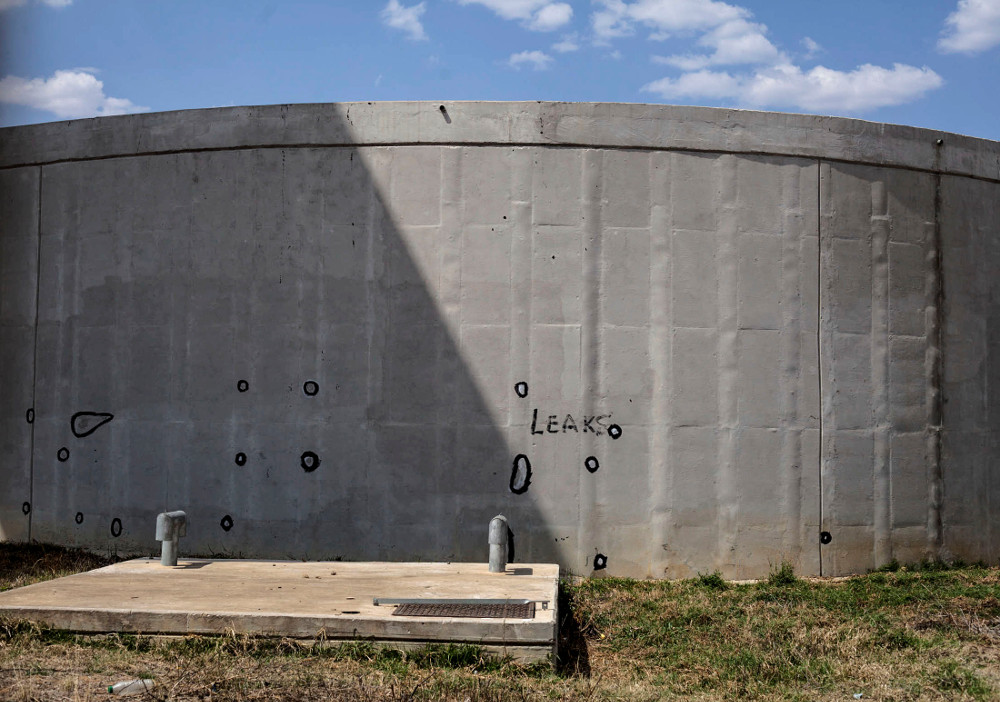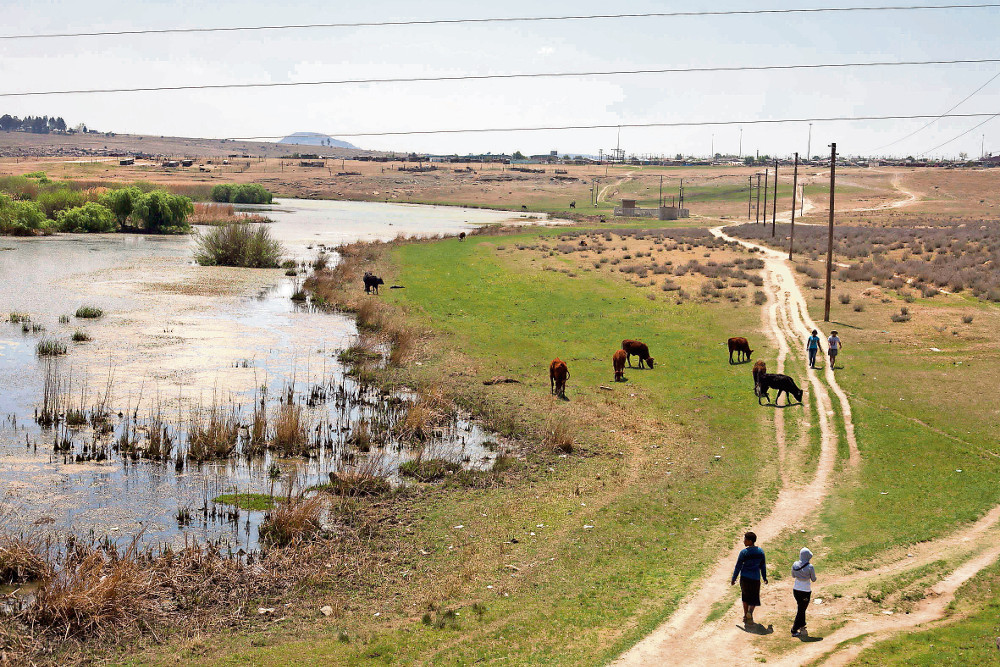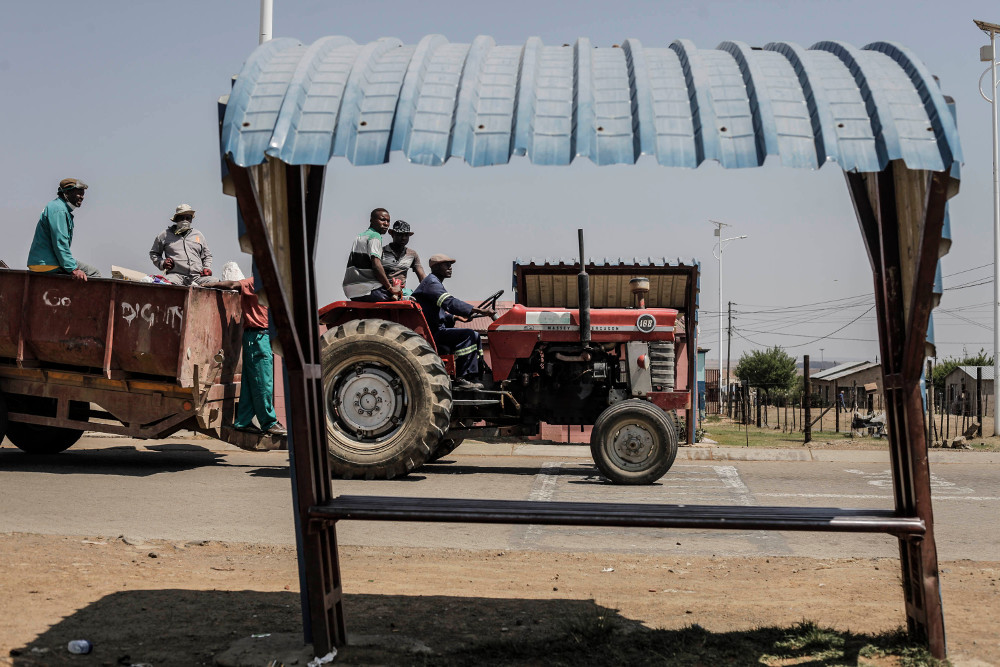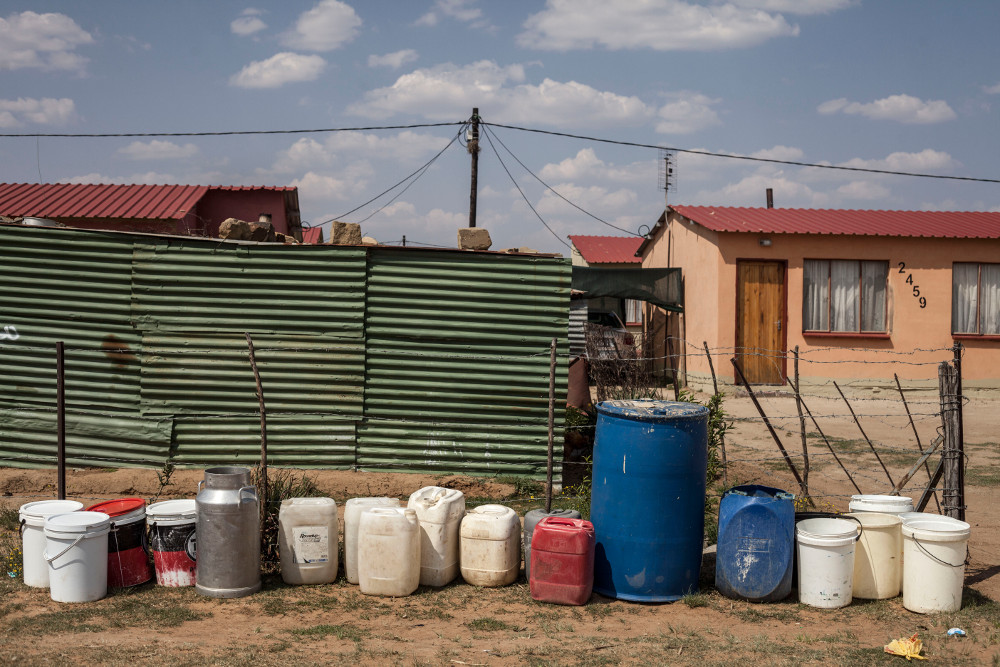Despite its opulence
South Africa’s new minerals minister, Mosebenzi Zwane, is called the “king of Warden” because of his influence over local politics in that eastern Free State dorp and the surrounding area.
During the ANC politician’s tenure as an MEC in the province, who is originally from nearby Vrede, was involved in numerous projects to develop the Free State. One of these, a dairy farm in Vrede, is being investigated by the public protector.
In his backyard of Warden, despite tens of millions of rands having been spent on service delivery, tractors still cart water and empty bucket toilets for the residents.
The century-old farming town makes few appearances in internet searches, one of which is a Wikipedia entry. This bemoans the lack of development and the fact that only Piet Retief Street is navigable.
This road houses rows of general dealers and towing companies servicing the adjacent N3.
The entry blames this entirely on the ruling party: “Since the ANC came to power in 1994, the town’s infrastructure has become extremely bad and most roads are now unpaved.”
The poor state of the town’s roads makes for a lot of dust – also a handy way of gauging how long a car has been parked. That dust is conspicuous by its absence around Zwane’s home.
The only two-storey house in Warden, its one-way windows sparkle in the hot Free State sun.

A water reservoir, built recently at a cost of R8-million, lies idle as cracks wait to be fixed. (Photos: Oupa Nkosi, M&G)
The pink wall that surrounds the property – high walls are another rarity here – is similarly clean. This could be because it is being constantly washed in the water-scarce town, or because the short strip of paved road outside provides a barrier from the dust that coats the rest of Warden.
The road starts abruptly a street from Zwane’s home, and ends in an almost impassable gravel and rock-strewn street a block away in the other direction. Warden’s massive church – one of the largest in the province – with its impeccably maintained rose gardens, does not have a paved road.
“That house is treated differently from others in Warden,” says a local who is afraid to be named. “This is a poor town. We have gravel streets and service delivery is a problem. But for some, allowances are made.”
The wind threatens to whip her wide-brimmed hat away as she speaks. “Here, there are two types of people: politicians and everyone else.”
That divide is personified in Zwane’s house and the local municipal offices, with its collection of expensive cars – when they are actually parked there and not outside local taverns.
People spit out “munisipaal” and point in the direction of the offices when asked about problems.
One woman, cleaning cups for her guests in the cool shade of her home, says officials look out only for themselves. “Warden is vrot [rotten], vrot, vrot.”
For some reason, many people here resort to Afrikaans when expressing their displeasure with officialdom.

A sewage treatment dam is one of the few green spots in the dusty town.
Zwane’s sprawling house – likened to Nkandla because of the thatched-roof rondavels in the backyard – is being investigated by the public protector, after the Democratic Alliance in the province laid a complaint. Leona Kleynhans, the DA provincial representative for the area, says the house was built on municipal land that was originally zoned as a park.
It was subsequently rezoned and Zwane then purchased the land, she says.
“It was also deliberately undervalued and there is a nonpayment of rates and taxes,” she says.
The municipal valuation says the house is worth R29 000 – although smaller homes on sale in the neighbourhood start at 10 times that. The protector’s office has confirmed to the Mail & Guardian that the complaint is being investigated. Zwane could not be reached for comment.
His home is on the extreme southeastern end of Warden, invisible from the township of Ezenzeleni. The Leeuspruit River, which separates the town from the township, has swelled substantially since the 2008 drought that drove farmworkers off the surrounding maize farms.
The river has been dammed to create an artificial wetland to treat sewage from the area.
In spring this wetland is still the only green in an otherwise dull-yellow landscape. Cattle graze along its banks. The homes of Ezenzeleni creep up from its shores, towards the summit of one of the rolling hills so common in this part of South Africa.
The lower sections are crammed with rusted corrugated iron homes, boiling in summer and freezing in winter. Trenches take sewage from yards, joining together to flow downhill in pathways easily traced by the green grass flourishing alongside them.
Tractors rumble along the narrow dirt streets to collect waste from buckets left in some yards. Working taps are rare. Flowing water is even rarer.

Warden’s traditional mainstay of farming has been curtailed by the scarcity of water in the area.
But there is a new development. Brick streets lit by solar-powered lights divide the township into sections, and pave the way to new schools.
Four faded signboards at Ezenzeleni’s entrance give details of the R85-million worth of water, road and sewerage projects for the area. Supposedly finished in 2013, most of these are still not working. Warden’s 2015 development plan says most residents have access to water. Access, but not flowing water. The publicly available version of this plan seems to miss out on key facts: “The percentage of households with access to piped water dropped from 99.1% in 2007 to …% [sic] in 2011.”
The only concrete information on service delivery in the municipality comes from other departments.
The national water affairs department talks of the R8-million spent on building a new three-million litre reservoir to take water pumped up from a new water treatment plant.
The reservoir is finished, and forms the easternmost boundary of Ezenzeleni. The grass has been cut and bird nests crowd the shadier parts of the massive cement reservoir. No water is flowing. Large black circles around cracks in the reservoir show a problem that will be expensive to fix. “LEAK” is written in bold letters next to these.
A water engineer who is familiar with the shortcuts taken in construction to maximise profits says this is where the bolts holding the original shuttering will have gone.
A special kind of cement is supposed to be poured into these holes. But it is expensive.
“We used to build water infrastructure to last a century. Now it’s quadruple the cost and falls apart in five years,” the engineer said when shown a picture of the reservoir.
A collapse has already occurred in the new section of Ezenzeleni, where the government has been building RDP houses.

Despite funds being earmarked for services, residents of Ezenzeleni township still have to queue for water from a tanker every morning.
The red brick homes that are now welcoming new owners were built at a cost of R15-million by Koena Property Developers, based in Newcastle – where the phone rings without answer.
The houses’ yards are stark, devoid of grass or any other vegetation. But people have started erecting fences, covered in old maize sacks to keep the wind out.
Succulents are the main choice of plant, with water not being readily available for any food crops.
Despite the project starting half a decade ago, the houses are new because the 336 RDP houses that were initially built were declared uninhabitable and knocked down. Koena was one of the companies responsible for that R10-million project.
The new homeowners tell the M&G that they have made peace with this delay.
Sitting in the shade, clutching a long metal rod, one old man says delivery still takes place: “The [water] tanker comes at 6am and we have water. Things are good.”
The old tractor and trailer collecting rubbish stops at his neighbour’s yard. Groups of workers in the ubiquitous orange public works overalls pick up and burn waste all over Ezenzeleni.
Everyone else the M&G talks to in the new part of the township is concerned about the delay in services, but happy that there are alternatives.
It is in the older sections, closer to the wetland further down the hill, that people are more disgruntled. Many are on still on the waiting list for an RDP house – a list that should have been shortened by a further 336 houses if the previous contract had not required that double the money be spent.
The “king of Warden” may be able to wield more power with his promotion to national government, but in his hometown service delivery suffers the same malaise as elsewhere in the country: last year the public works department told Parliament that R58?billion was being spent to repair poorly built RDP houses.